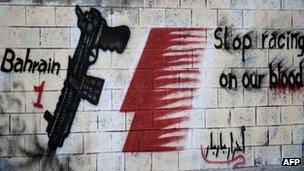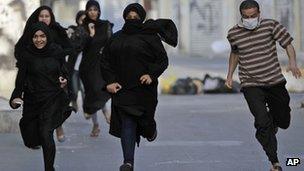Grand Prix dilemma in Bahrain
- Published

Many in Bahrain's opposition movement feel this year's Grand Prix should not go ahead
Bahrain is once again at a crossroads.
Fourteen months since predominately Shia protests erupted against the rule of the Sunni monarchy, questions are being raised over whether one of the biggest events in Bahrain's calendar should go ahead.
The Formula 1 Grand Prix is due to be held on 22 April and for the tiny island Gulf state this is huge.
It indirectly employs thousands of Bahrainis, both Shia and Sunni, and, according to the government, brings in hundreds of millions of dollars' worth of business, putting Bahrain firmly on the world sporting map.
The problem is, those protests are far from over, the country is perhaps more divided than ever along sectarian lines, and one of the most prominent pro-democracy campaigners, Abdulhadi al-Khawaja, is two months into a hunger strike in protest at his life sentence on charges of trying to overthrow the monarchy.
If he dies in custody, as his lawyer warns he might, then the simmering daily clashes between police and protesters in the Shia villages will likely explode.
'Up to the people of Bahrain'
Little wonder that some of the international F1 participants are voicing doubts about whether they want to take part. Last year's F1 Grand Prix in Bahrain was postponed, then cancelled.
So should Bahrain's F1 go ahead this year or not?
Formula 1 Group CEO Bernie Ecclestone said on Tuesday this is "up to the people of Bahrain" and at the moment it is going ahead.

Protests against the government have continued in Bahrain for the past 14 months
Essentially it boils down to two factors for teams to consider: safety and morality.
On safety, the Bahraini authorities are likely to take every possible precaution to shield participants from any unpleasantness. They will be chaperoned, escorted and protected, from airport to hotel to race track.
The venue itself is out in the desert, halfway down the island at Sakhir - and far from the troubled villages where Molotov cocktails are traded nightly with the riot police.
A long-term Bahrain resident said: "They may experience traffic jams but hopefully nothing worse".
But the issue of moral conscience is rather more complex.
Bahrain is where the Arab Spring visibly failed last year, smothered by draconian security measures that saw several unarmed protesters die in custody. Al-Khawaja himself was arrested in his house at night and beaten unconscious in front of his screaming family.
'No meaningful dialogue'
Since then, an independent commission of inquiry, the BICI commission, has investigated thousands of claims of abuses, found the government guilty of systematic abuse of prisoners, and made numerous recommendations to improve human rights which the ruler, King Hamad, has promised to act on.
Reforms include two senior police officers being drafted in from the UK and US to advise Bahrain on how to improve community policing, while several junior Bahraini officers are being investigated for alleged abuses.
But the opposition says the reforms are mainly cosmetic, innocent people are still in jail and there is no meaningful dialogue under way on how to share power more equitably, despite the efforts of the more reform-minded members of the ruling al-Khalifa family and moderate voices in the opposition.
If this month's Grand Prix is cancelled it would effectively be an international vote of no confidence in Bahrain.
This is exactly what many of the government's opponents want, sending a message that as long as the country's Shia community feels disenfranchised then why should it be business as usual?
But a senior official in Bahrain, who asked not to be named, told the BBC "cancelling the Grand Prix would be a real backward step and is not going to benefit anyone, either politically or economically.
"It will send the Sunni community apoplectic and make it harder than ever for moderates to reach common ground."
- Published10 April 2012
- Published11 April 2012
- Published9 April 2012